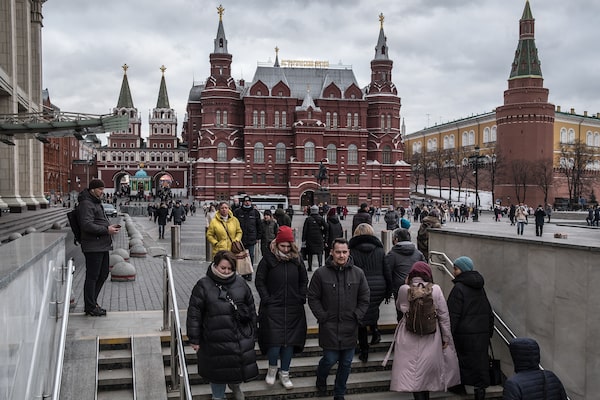
The Kremlin in Moscow on Feb. 26.THE NEW YORK TIMES/The New York Times
Days before Russian President Vladimir Putin invaded Ukraine, the Levada Center, an independent polling and research firm in Russia, surveyed respondents about who they viewed as the instigators of the conflict in eastern Ukraine. The overwhelming majority of respondents – 60 per cent – blamed the U.S. and NATO, followed by 16 per cent who blamed Ukraine, and 15 per cent who couldn’t say. Just 4 per cent of Russians polled believed that their own country – which had, by then, stationed tens of thousands of troops along the Ukrainian border – was responsible for the recent escalation. The proportion of Russians who blamed the U.S. and NATO was up from four months earlier, when 50 per cent of respondents saw the West as the main culprit.
The results were a measurable testament to the efficacy of state news propaganda, which had, particularly since the annexation of Crimea in 2014, coalesced around the theme of a nefarious type of 21st-century Western imperialism. That message has only intensified after Russia invaded Ukraine, with stories about the West sending mercenaries to fight among Ukrainian nationals and Europe mocking Russia’s claims of genocide in the Donbas dominating news headlines. An incredibly foolish tweet by U.S. Senator Lindsey Graham suggesting someone should “take out” Mr. Putin provided TV evening news fodder for days.
Whatever contrary views ordinary Russian citizens might have been able to access have evaporated in the days since the Kremlin shut down independent television channels such as TV Rain, and passed a law that makes spreading “fake news” about the Russian military punishable by up to 15 years in prison. Insulated from outside information and imbued with state propaganda, many Russians do not know or believe reports of what is actually happening in Ukraine.
Why no no-fly zone over Ukraine? Because we don’t want to start World War III
A far away war that feels so close
The effects of the war on their daily lives, though, will soon be undeniable, if they aren’t already. Less than two weeks after Mr. Putin launched his unprovoked attack, Russia has become the most sanctioned country in the world. The ruble has lost about half of its value since the beginning of the year, and ordinary Russians have seen the value of their savings deplete in a matter of days. Logistical challenges caused by economic sanctions and the suspension of service by large shipping companies could mean supplies of certain foods and medicines become dangerously low (even though essential supplies are supposed to be exempt). And every day, the long list of Western companies that are limiting their involvement in or exiting the Russian market altogether grows longer.
Russian citizens are watching their country morph into a pariah on the world stage – becoming evermore isolated economically, physically and socially – and it will be those ordinary people who will bear the brunt of the suffering caused by sanctions. The question is whether they will turn their ire inward at a regime that launched the war (which is still just a “special military operation” in the words of Russian news media), or whether these sanctions will only fuel the perception that the greatest threat to Russian stability really is the West.
There is scant evidence that sanctions alone stop wars, or lead to regime change, or pressure citizens to compel their leaders to shift course. Though sanctions might be the strongest tool Western governments currently have to counter Russian aggression (along with providing military aid to Ukraine, and short of actual troops on the ground), the unintended effect is, at best, that regular citizens merely endure – in extreme cases, by starving, as in Iraq in the 1990s after the UN levied sanctions over Saddam Hussein’s invasion of Kuwait. At worst, citizens endure while simultaneously being invigorated by nationalist forces, as in Yugoslavia under Slobodan Milosevic. Sanctions against Cuba, Venezuela, Iran and North Korea have generally functioned to exert pressure on ordinary citizens while failing to meaningfully halt nuclear proliferation or topple corrupt regimes.
In Russia, the Ministry of Education recently announced that all schoolchildren would receive a lesson on “why the liberation mission in Ukraine is a necessity,” which would include background information on the persecution of citizens in Donetsk and Luhansk, as well as “the danger that NATO represents to our country.” The hope, of course, is that children and their parents will heed that lesson when they pass by a boarded-up Ikea in Moscow, or when certain payment systems stop working, or when they can’t find or buy the goods they need in the weeks to come.
Those inclined to seek alternative media will understand that Russians are suffering because their autocratic leader launched an unprovoked attack on a sovereign nation. But those who won’t or can’t may simply double down in their belief in the need for “Fortress Russia.” For years, Mr. Putin has warned his citizens about the threat the West poses to his country. And now, through the crippling effect of sanctions and corporate exits, those warnings are seemingly coming to pass.
Keep your Opinions sharp and informed. Get the Opinion newsletter. Sign up today.
 Robyn Urback
Robyn Urback